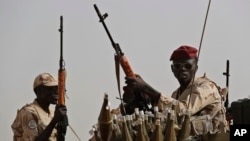The U.N. Security Council demanded Thursday that the paramilitary Rapid Support Forces (RSF) halt their siege on the North Darfur capital, El Fasher, as they are poised to take the last remaining city in Sudan’s Darfur region from the Sudanese Armed Forces (SAF).
The council adopted a British-drafted resolution in a 14-0 vote. Russia abstained. The council also called for de-escalation in and around the city, where more than 800,000 civilians have been sheltering, many of them displaced from other parts of Darfur that have fallen to the paramilitary group.
“This council has sent a strong signal to the parties to the conflict today,” British Ambassador Barbara Woodward said. “This brutal and unjust conflict needs to end.”
It was not immediately clear if the parties would heed the council’s demands. An earlier resolution in March that called for a cease-fire during the Muslim holy month of Ramadan was ignored.
The situation in North Darfur’s capital escalated on May 10 when clashes erupted inside El Fasher between the SAF, who are inside the city, and the RSF, who attacked surrounding towns before entering the state capital. Thousands of people have since tried to flee, and humanitarians report hundreds of civilian casualties.
Sudan’s deputy U.N. ambassador said El Fasher is facing “great and unprecedented dangers,” and he urged the council to hold responsible external actors who are fueling the conflict.
“The support by some countries to these militias directly contributes to the continuation of violence and destruction in the Sudan,” Ammar Mohammed said. “And we name here the official and regional sponsor of the criminal militias — namely the United Arab Emirates — whose support and weaponry leads to entrenching the suffering and misery of civilians in the Sudan.”
The United Arab Emirates has repeatedly denied sending arms to the RSF. But a report by a U.N. panel of experts earlier this year said there was substance to media reports that cargo planes originating in the UAE capital, Abu Dhabi, had landed in eastern Chad with arms, ammunition and medical equipment destined for the RSF.
Meanwhile, the humanitarian situation grows more dire by the day. The United Nations warns that 5 million Sudanese are on the brink of famine, including tens of thousands of people in the Darfur region.
The council demanded in its resolution Thursday that the parties ensure the protection of civilians and facilitate rapid, safe and unhindered aid access.
“The impact of today’s vote will be measured by the results on the ground,” said U.S. Ambassador Linda Thomas-Greenfield. “So, the RSF and SAF must heed the demands of this council. We will be watching closely. If the situation on the ground doesn’t change for the better, this council must take further action.”
She said that could include authorizing cross-border aid access from Sudan’s neighbors.
Catastrophe unfolding
The head of Yale University’s Humanitarian Research Lab, which has been tracking action on the ground in Sudan for months using satellite and other technology, told reporters on a conference call Thursday that an SAF defeat in El Fasher could be imminent.
“We are talking hours and days before the potential fall of El Fasher,” Nathaniel Raymond said. “And we are talking about a Sudanese Armed Forces contingent — the 6th Infantry Division — that we can assess is clearly outnumbered and surrounded by RSF, who are gaining ground … from multiple directions inside El Fasher city.”
He said the lab has also observed growing damage in and around El Fasher in the past 10 days, equivalent to the size of more than 200 football pitches. That includes signs of significant looting at the city’s last remaining hospital. People are also on the move in large numbers.
The United Nations and others fear a full-scale battle for El Fasher could unleash atrocities similar to the genocide carried out by Arab Janjaweed fighters against African Zaghawa, Masalit, Fur and other non-Arab ethnic groups in Darfur in the early 2000s. Janjaweed fighters make up elements of today's RSF.
Paris-based medical charity Doctors Without Borders, known by its French acronym MSF, said Thursday that only one surgical hospital is still functioning in El Fasher since South Hospital was shut down after being raided and looted by the RSF.
Both the RSF and SAF were added to the annual U.N. list of shame, published Thursday, for perpetrating grave violations against children during 2023. They were blacklisted for killing and maiming children, for attacking schools and hospitals, and in the case of the RSF, for sexual violence and recruiting and using children in their ranks.
“We have to alert the international community that there is a catastrophe happening in El Fasher of a magnitude that we have not seen before,” said Omer Ismail, a former Sudanese diplomat who was born in Darfur and documents war crimes for The Enough Project and The Sentry organizations.
“I know the attention of the world is not on Sudan at this point, but we call for that urgently,” he told reporters in a briefing call.




